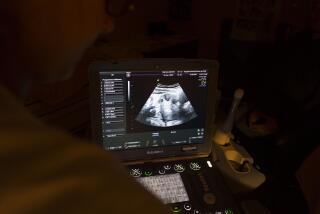Limits Advised on Use of Test for Cancer Gene
- Share via
SAN FRANCISCO — Most women should not subject themselves to the test for the so-called breast cancer gene, according to a group organized by Stanford University that proposed new guidelines Saturday to avoid misuse of a just-released commercial test for genetic susceptibility to breast and ovarian cancer.
The test detects crucial alterations in the genes known as BRCA I and BRCA II, which are responsible for much of the breast and ovarian cancer that runs in families.
If a woman has inherited such an altered gene, it raises her lifetime risk of developing breast cancer to between 80% and 85%, up from the 10% or so risk that other women have.
“This test is not an unambiguously good thing,” said Henry Greely, a Stanford law professor and chairman of the 53-member group that drew up the guidelines.
Because of the many pitfalls, he said, “if testing is not done well, it’s not worth doing.”
The group was especially concerned about patient privacy issues, in particular the possibility that a woman who tested positive could be denied health or other insurance.
The guidelines, presented at a bioethics conference run by USC’s Pacific Center for Health Policy and Ethics, are largely intended to prevent the commercial exploitation of women’s fear of breast cancer.
Other medical groups have offered recommendations on cancer-susceptibility testing, but these are the most comprehensive, researchers say.
Breast cancer strikes 185,000 American women annually, but only 5% to 10% of cases are the result of inheriting the BRCA I or BRCA II alteration, researchers say.
*
The guidelines recommended that most women avoid the roughly $2,400 commercial test because it would waste money and perhaps create a false sense of security, since a negative result would not mean a woman had zero disease risk; instead, it would be about one in 10, like other women.
The group also recommended that the test not be used on children, even if their parents request it, or prenatally.
Only women from families with a pronounced history of breast or ovarian cancer--typically at fairly young ages--should consider taking the gene test, the researchers said.
*
Even then, questions remain about its benefits and drawbacks, the group said, particularly how a woman should react to a positive test.
“There are no known methods for preventing breast or ovarian cancer that would be particularly important to women with [altered] versions of these genes,” the draft guidelines said.
But a co-founder of the company marketing the test strongly objected to that statement: “Utter nonsense” and “a great disservice to women,” said geneticist Mark Skolnick of Myriad Genetic Laboratories in Salt Lake City, which began marketing the test Oct. 30.
He said a woman who tested positive for the BRCA I alteration could lower her risk of ovarian cancer, which would be 40% to 50%, to about 3% by having her ovaries surgically removed.
The test also could spare many women unnecessary surgery, Skolnick said. Before it was available, many women over 35 with a pronounced family history of breast or ovarian cancer had their ovaries removed to prevent disease. Now, only women who inherited the BRCA I or BRCA II alterations would do so, he said.
More to Read
Sign up for Essential California
The most important California stories and recommendations in your inbox every morning.
You may occasionally receive promotional content from the Los Angeles Times.













